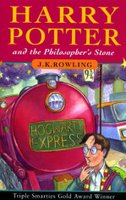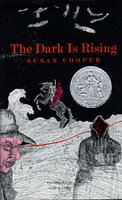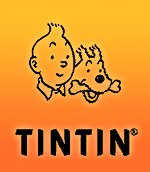 As I confessed in my previous post, my resistance to Harry Potter has flagged recently, and under the pressure of direct appeals and subtle gambits by fellow bloggers, I've decided to go all the way and crack open Harry Potter and the Philosopher's Stone. As I throw away my jealously guarded Potter virginity, however, I'd like to invite all those Potterphilic Muggles who haven't yet taken the plunge to crack open the first and/or second volume of a considerably earlier classic children's series: Susan Cooper's Over Sea, Under Stone and The Dark Is Rising.
As I confessed in my previous post, my resistance to Harry Potter has flagged recently, and under the pressure of direct appeals and subtle gambits by fellow bloggers, I've decided to go all the way and crack open Harry Potter and the Philosopher's Stone. As I throw away my jealously guarded Potter virginity, however, I'd like to invite all those Potterphilic Muggles who haven't yet taken the plunge to crack open the first and/or second volume of a considerably earlier classic children's series: Susan Cooper's Over Sea, Under Stone and The Dark Is Rising.  As I mentioned in the comments section of the piece on Potter, I'll be posting a review essay that compares Cooper's fantasy to Rowling's in a couple of weeks. In the meantime, if anyone has thoughts of their own about either or both of these series, please post them here or send me a link to the entry on your own site, which I'll post below. What are the aesthetic virtues of each series? What, if any, are their weaknessness? Which is the superior "classic"? How unfair is this comparison?
As I mentioned in the comments section of the piece on Potter, I'll be posting a review essay that compares Cooper's fantasy to Rowling's in a couple of weeks. In the meantime, if anyone has thoughts of their own about either or both of these series, please post them here or send me a link to the entry on your own site, which I'll post below. What are the aesthetic virtues of each series? What, if any, are their weaknessness? Which is the superior "classic"? How unfair is this comparison?
Most importantly, will Jim really follow through on his latest promise to actually read one of these books? Will he ever stop lying about his intention to read Rowling? Find out in Stone v. Stone: The Susan Cooper - J. K. Rowling Challenge!
Tuesday, November 29, 2005
Stone v. Stone: The Susan Cooper - J. K. Rowling Challenge
Subscribe to:
Post Comments (Atom)




4 comments:
Excerpts from a long essay which was wrong in many parts.
But:
One thing people always forget, is that kid's books are for kids. Children have no patience for arguments that are morally null, or for threats that are everyday (I should say banal) only writ large (a giant garbageman with an extra big can and a gruesome roar and a punning name scares no one, I think, unless Harry Potter says it's scary). But the Susan Cooper books provide a glimpse of a cosmic struggle outside the everyday in which even (and especially) the choices of children could tilt the scales of good and evil, and that's different. Susan seems very much in line with the real concerns of little kids: what rock to pick up. What picture to find beautiful. What unproportionate house to become attracted to. Where to find a face in a cliff. What magic to presume in a tree that looks like a throne, or a crown. What glum adult to trust. The elementary magic of childhood: to a child, these are decisions or incantations, not coincidental encounters. They have meaning precisely because the meaning of a child's life is externally determined, and they are far from meaningless choices, to see magic rather than mere human enterprise in people's actions. To every child (I think) every pebble or broken piece of glass or secret cave or personal history of an older relative is magic. And it isn't just simply magic: it's connected to other things, so it's MAGIC, not just magic as we adults think of it, we adults to whom the knowledge of the interminable connectedness of things is a curse rather than a blessing, but MAGIC, the magic that blooms in a child's mind when they first start to see the promise of the adult world where things mean things to each other. Which is the adult world, if we take a pause to think of it, in which meaning is therefore both temporary and accidental. But to a kid it doesn't look like that, you understand. To a kid, the adult world is a landscape of unexplored (and therefore potential) meaning. And they have never even heard of temporary meaning, anyway. They see permanence everywhere, as we all could remember and respect if we chose to do so.
But, blah! You know and I know that we both don't have time for that. The market closes in an hour, get out of my way with your snakes and ladders kid...!
Anyway, to me as a child, Susan's books were more than novel, they were strangely familiar - or, rather, everything was familiar, but the familiar was recast as cosmically, mystically important, as common things weighted down with a great deal of symbolic baggage, just as I thought my own family's life was the story of the sun and the moon and the birth of the very stars. Myth and the weight of magic is in the closest place you can discover it, I found by reading her; everything is a study of thunder and lightning and twiddly little fairy lights, even things that seem stupid and prosaic have these energies lying underneath them that defy description, and especially the closest things have concealed within then the greatest wonder. So: in "Over Sea, Under Stone" nothing is said, nothing is defined - but a feeling of some magic, some import, some conflict between light and dark forces is there, and at the end it's all validated by a triumphal victory...for someone, over something. But you feel great! Hilarious! Elliptical! Wondrous! But at the same time kids are not idiots. An explanation from a higher power would be nice, and appreciated. You know, eventually. Kids are patient, too, but not limitlessly so. So, okay: in the second book, surely the family dynamics of Will Stanton did not stand for nothing either, but they were hilariously elliptical too; in this second book, even though the conflict between Light and Dark was more explicitly put forth, even though so many events were given a denotative meaning that the events of the previous book would have eschewed, the conflict was the same, and just as real. Or, even more real. Or, it wasn't real! Or, real was never real at all, but the unreal was real! Yeah. Well, what were all these different characters struggling over anyway? You see, kids can be satisfied with just a very little information, as long as you're not leaving them entirely in the dark...as things became more definite in "The Dark Is Rising", they invite a greater distrust, and the reader wonders what Will is going to do. They know he won't do bad, but if he doesn't do bad there is some sense of danger around him, and what'll he do then? Ah, Will, a strange character threatened by other strange characters, which never seemed real, but always unreal...and yet real or not, they seemed normal to the average kid reader somehow, in that these events, these characters, these symbols in human form, as ludicrous as their descriptions were, struck some sort of chord of normality or comprehensibility in the mind of the reader. And they were never accidental, either, not any of them, not even the simplest of them, so they were very far from abnormal! Even the simplest of them was carefully chosen as both ordinary and fey at the same time; nothing escaped the fey touch, not even the tropes of normality. The steady twins who prop each other up...the older brother experimenting with independence and adulthood, and temptation, who is mature and so therefore vulnerable...you see how the psychological business of C20 mixes with the images of C19 in the imagination of C21...but anyway...the motherly older sister who could be deceived even as she's pregnant...wow! And of course James the dark "twin" who is not a twin..(oh, that's original!) rounds out the list of all of these characters who are like a hidden pantheon of symbolic faery importance in Will's story, indeed they all play a part in the mythic interpretation of Will's life before they're done...I mean it's ridiculous to call these mere accidental signals! Ridiculous! Obviously the twins (for example) are exempt from any abnormal vision of life because they reinforce each other's view of the world, because they represent a world unto their own to each other (but consider the dark-and-light twins of the Second Brach of the Mabinogion, or the dark and light twins of Norse mythology, who are Loki and Thor...but then again the twins here balance, and by balancing become unimportant, just as the twins in "A Wrinkle In Time do - holy heck, somebody do a better analysis of that than the one I just did, I just made myself sick!), and the truly innocent sister in this book is as immune as Cindy-Lou Who from the consequences of her brother's actions, because she is shielded by her siblings and parents, whose love (we are told) is "sacred." Well, she may or may not be one of the children of Llyr, but Dad might as well be named Nuala in any case, and I think Mom is actually named Dana, damn her, and all-too-obviously Will Stanton, Of The Thousand Talents, child of both worlds, aged 11, is the ONLY one who can see things as they are, because he fails to be innocent and he fails to be other than innocent, he fails to be fey and he fails to be Christian, he fails to be ignorant and fails to be knowledgeable too, he is at the very cusp-point of innocence and experience where one must make some decision (too soon, of course) about what one is to be, on nothing but feeling, and there is no guarantee he will choose anything like success...
...And, oh yeah, Harry Potter, which as I said before I like. See the comparison? I hope so. But he's not much of a character, that old Harry, not compared to Will Stanton anyway...I mean, he struggles not, really. He doesn't really have flaws, he's innocent in a way none of us will ever be, that Will isn't for example. How ironic will it be if he turns out to be Darth Vader's son! God, I hope that doesn't happen. So anyway though, Harry can combat all the dark forces he likes, but they'll never mirror any inner darkness of his own, which ordinarily would kind of be the point. And that's kind of stupid. You know, of Harry. But don't get me wrong, old J.K. isn't stupid, not one bit. She's smart, all right. I mean it's already been set up that Harry's Dad wasn't any lily-white character, and that's something, a little complexity, character-wise, to tell you the truth that impressed me a lot. But still, can anyone doubt that the last installation of Harry is going to involve Harry destroying any new way for Voldemort to incarnate himself, and so Voldemort will incarnate himself in Ron, and so Harry will have to kill Ron, and Ron will fight Voldemort and win one moment of sanity and say "Harry, kill me", and then Harry's wand will reach out under Ron's mental control (because Voldemort immobilized Harry by taking control of his wand...remember (how could you forget?) the two wands are from the same source)...and stab him in the heart, without Harry being blameable for that?
JESUS CHRIST I hope that doesn't happen. You know, I love Harry Potter, I find those books tremendously soothing, they're like the distillation of all the old fantasy books I used to read as a kid, only more childlike. But if that garbage happens I am going to write ol' J.K. a letter saying, "listen baby...you know that's not new, right? Be smart. Surprise me. And I'll love you for it."
J.K., I hope you're listening! Don't do that, for God's sake!
Well, that was a long post, wasn't it? Jim, if you feel it's too long and therefore worth deleting, I won't raise one bit of a fuss. This was practice. And also a bit incoherent. As you can probably guess, that means I'm warming up. Also my thoughts were not well-considered here, just shooting from the hip and so on...really what I want to do is reach that first respondant to the Harry post, and tell her Harry Potter is fun! It isn't good, honestly, I would not kid you. But it's fun! So who cares? A little bit of fun keeps us all from going balouche, as my Grandad would say. But I swear to God if it turns out Princess Leia is Harry's sister...
I feel things in the Susan cycle went way down after Greenwitch. I mean I respect the structure. But for me it didn't start to pay off like it might've. Maybe I was too old, I don't know. But what a BBC movie Greenwitch would make! With The Grey House and everything, and old Capt. Soggy...!
Jim! Stop me from writing!
Merriman
Merriman,
That was just...er, gosh. I hardly have to write that essay I was planning now! Your description of the "elementary magic of childhood" in Susan Cooper captures exactly what makes her books special and exactly why I love them--with more precision than I could hope to manage. Beautiful, and so exact. This really took me back to that experience. Thanks for the tremendous post--I'm looking forward to rereading the books (next weekend) more than ever now!
I am always amused when someone recommends Harry Potter for its "darkness". If I want darkness, I watch an episode of Millennium, I don't turn to children's fantasy fiction.
I was originally drawn to the Philosopher Stone not because it was so dark, but because it was so funny and silly.
The series has certainly become more serious and complex as it has moved along, but that isn't what distinguishes these Rowling’s books. What makes the Potter books worth reading is how much fun they are to read.
Yeah, I think the "dark" elements in Harry are constantly being overrated in some purposeful way. The weird blend of threat and simper isn't very artful, but I guess I can't argue that it's ineffective, as witness the sales figures...
Funny, those "dark" elements are really no different from what you would find in a latter-day Stephen King or Dean R. Koontz thriller: standard-issue undead soulsuckers, etc. Even to the revelations about Harry's father being not such a nice guy...I can see how (particularly to a child) these would be disturbing undercurrents. And yet it's all plastered over with kiddie-style friendly ghosts and patronizing names for special magic things. Don't let me say I don't enjoy it too, because I do: especially the more serious but still juvenile parts, the parts that aren't weighted down with an excess of punning cuteness. But it's a helluva mishmash, isn't it? Crazy. And not, I think, made especially valuable by its darkness. Even though everybody says that.
Post a Comment